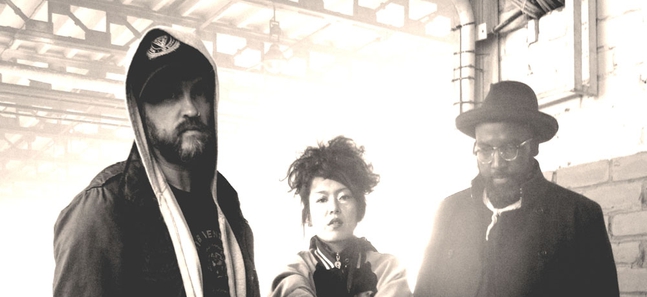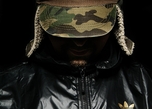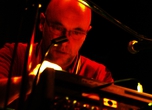King Midas Sound: the interview
Kevin Martin: ‘Music is the only thing I have faith in in this f***ing world’

King Midas Sound: (from left) Kevin Martin, Kiki Hitomi, Roger Robinson
Posted: Mon May 28 2012
Kevin Martin doesn't do compromise. Back in January, the producer had a gig booked at London's Bishopsgate Institute with King Midas Sound, his crushingly heavy dub collaboration with vocalists Roger Robinson and Kiki Hitomi. But when the venue – a concert hall more accustomed to classical music than sound system onslaughts – announced on the day of the event that the group would have to rein in their decibels, they promptly cancelled. As they said on Twitter afterwards, better that than 'present a sub standard show.'
To anyone who's followed Martin's career to date, this wouldn't have come as a surprise. From the industrial jazzcore of early '90s group God – the first of many collaborations with former Napalm Death member Justin Broadrick – to the corrosive dub and dancehall of The Bug, he's been a consistently bracing presence on the UK music scene for two decades now. Even when The Bug's 2008 album London Zoo was embraced by the burgeoning dubstep movement, commercial crossover was never an option: his gig supporting The Qemists at Liquidroom the following year sent half of the audience scurrying for the exit within the first few minutes.
Given his reputation for sonic brutalism, Martin seemed to have taken a significant detour on the first King Midas Sound album, 2009's Waiting for You, which preferred stripped-back eeriness to full-frontal assault. Or at least, that's what the record sounded like: the King Midas stage show has morphed into something far more overwhelming, a bass immersion that one reviewer compared (much to Martin's delight) to My Bloody Valentine in dub. Tokyo audiences can get their first taste when the group plays here on June 8, on a bill with Hyperdub label mates Kode9, Dean Blunt and Inga Copeland (aka Hype Williams) and DVA.
And there won't be any decibel issues this time around: the venue is bringing in extra speakers especially for the occasion.
I've been following news of King Midas Sound shows on your Twitter feed recently, and it reads more like field reports from a war campaign…
Yeah, it's like a war zone, being in King Midas Sound. We just seem to be accumulating enemies and fucking with people wherever we go. And not actually through our wish: it's just people don't seem to enjoy the fact that you know what you want as an environment or as a listening experience. You're just meant to eat shit and be happy about it, really.
Is that often just because of legal restrictions on sound levels?
In France, it's very much about legal restrictions. Elsewhere… it can be variable. Not every show is a disaster. Some shows are amazing, you know? I guess it's part of the reason why I still love making music, because it's so random and unpredictable: you have no idea from one show to the next how it's going to turn out. I'm quite happy to just come face to face with that chaos and see what happens, really.
Do you think that sets you apart from a lot of other people who are making electronic music? I imagine plenty of them would prefer to have more control, even if they can't necessarily get it all the time.
Yeah, I'm sure. I guess I'm quite strong-willed about how I want to present music; some people I know in electronic music are less so. What inspired me to make music in the first place was confrontational music, and music which for me literally changed my life – which seems unfashionable to talk about now, because music's increasingly relegated to a lifestyle accessory. But for me music is a core of my life: it's the only thing I have faith in in this fucking world.
What were some of the biggest musical epiphanies for you?
What made me make music initially was listening to a lot of post-punk: people like Joy Division, The Birthday Party, Crass, Throbbing Gristle, 23 Skidoo. Then hearing Public Enemy's first album for the first time just completely blew my head off, actually gave me a headache. I just thought, 'What the fuck is this all about?' I didn't understand what any of the cultural references were or what any of the music was about, didn't have a fucking clue what they were rapping about. That's probably a key to everything that I've liked most, is that when I've first come across it, I've just had that huge 'What the fuck?' moment. We talk about that a lot in King Midas: that we're quite happy for people to say 'What the fuck?' when they come to a King Midas show, and hopefully go away just a bit gobsmacked, because all the best musical moments for me are like that.
Listening to the King Midas Sound album for the first time, I really wasn't expecting that it would turn into such a visceral live experience…
Neither did we.
Did that come as a surprise?
Definitely, it surprised us. Basically, we played the first couple of shows, and they went down really well, but we just said: that's not what we want. It's too zoned out for the live arena, and it's too comfortable for people. We just wanted something that people go away talking about, both positive and negative – but just something that would leave an indelible impression.
Didn't it almost feel like you'd gone against what you were originally intending to do with the project?
Yeah, yeah. [Laughs] That's completely true. Originally, the album was about intimacy, melancholy, depression and loss, whereas the live show is much more about intensity and being overwhelmed – but being overwhelmed by emotion, again, so there are strains that run through. It's just it's a very different impact.
You're going to be appearing on a pretty sweet lineup when you play over here…
It's going to be a crazy little tour. I mean, we're coming over with Hype Williams, who are equally as freakish as we are, and as uncompromising. We've now formed a mutual appreciation society, I reckon: we're just trying to out-headfuck the crowd. They've now nicked our sound man, nicked our lighting show, and just nicked our antagonistic beliefs, really, but they're amazing, plus they're really strong allies. And we're also coming over with Kode9 and Scratcha DVA – it's exactly the sort of company I enjoy. It's mixed musically, mixed culturally, and just a group of comedians on one tour.
How did you meet Hyperdub boss Kode9 originally?
I met Steve when my album Pressure came out, and he interviewed me for [US music magazine] XLR8R. We just got on really, really well, and he invited me down to a new club which had only just opened – which was [dubstep night] FWD>>. At that time, there were like 20 people in the audience, who were all producers, and no audience at all. It was people like Skream, Mala, Loefah, Benga who were in the crowd, and that's how I met all those dudes – all thanks to Steven.
It's kind of interesting how that whole scene evolved. When you look at the names of the people who were right there at the beginning, it can sometimes feel like the ones who jumped in later on didn't bring all that much to the table.
I think it's the way with every genre. It happens when a genre evolves, like jungle to drum 'n' bass, or the way hip hop self-cannibalised itself. The initial warriors are the ones that have eclectic tastes and just bring those through and develop a fresh sound, then you just get the cannibals, parasites, snakes, sharks, moving in for the entrails.
You've had a new Bug album in the works for quite a while now, and I was surprised to see Portland drone artist Grouper on the list of collaborators. Having seen her in Tokyo recently, I'm still struggling to imagine what the hell that would sound like.
Yeah, you know what? When I approached Grouper, I didn't know her at all, and it was just a coincidence that our agent from King Midas Sound also acts as her agent. I sent off this email, expecting nothing in return, saying, 'Yo, I'm The Bug, here's a couple of links to my videos. Would you be interested in collaborating?' – and I just got this crazy email back, where she was saying how she played 'Skeng' to her mum in the car the week before. And I just thought, 'Wow, this girl is out there…' I've written about seven riddims for her, which are just more zoned-out Bug riddims. You know, if you listen to Pressure, or you listen to the London Zoo tracks that aren't all about bashing people round the head, it's more that sort of feel – but even more out there. I've called the album Angels and Devils, so it's just about the disparity, and the extremity in sounds and philosophy.
Still, there's a pretty huge volume difference between your sets and hers…
Yeah, she's micro, isn't she? There's a sort of intimacy in the stuff that she does, which is amazing – a real sensitivity. I saw her recently for the first time in London, and I was struck by how uncompromising she is in how she presents what she does. It's just so quiet, and she wants it to be that quiet. I think we meet where the extremities and polar opposites meet, and that's really cool, you know? It's nice to meet someone from such a radically different area, and also just to fuck with people's expectations. In music, people want to turn you into some one-dimensional cartoon character, and that's really not me.
There was a lot of talk a couple of years ago about a collaboration you were doing with Adrian Sherwood, and then nothing seemed to come to light. Is that still in the works?
No, it's not going to happen. I talked to Adrian a lot about it, did a lot of preparatory work on it, and we were going to definitely do it together. But I talked to a lot of friends close to me, and [we] just were saying, 'What would you be more interested in: a "Bug in Dub" album or brand new material?' And everyone I spoke to just said new material, unquestionably. So I just went that way.
Do you think you might ever do something else with him?
With Adrian? I hope so, yeah, because he's an incredible producer. Actually, speaking of people who did totally inspire me, for sure: early On-U Sound, early African Head Charge stuff, definitely. I was 100% smitten by that early On-U Sound material, without a doubt, and I wouldn't be making Bug music if that stuff hadn't existed.
Going from Pressure to London Zoo, it felt like there was quite a distinct shift in the sonics. Do you think with the next one that there's going to be a similar leap?
Part of the reason for spending so much time on King Midas was to spend a lot of time away from The Bug, because it had become its own sort of crazy monster, and I was just being sucked into dubstep. I went through a lot of soul searching, trying to think what the hell I want, and basically I realised that a lot of artists I like most have a continuity to what they do. It would've been really easy for me just to say, 'You know what? Fuck everyone' and do the opposite – which is my normal, natural inclination. But actually, it would've felt like a swindle to do that, and just false to myself. I was really happy with London Zoo, I was as happy as you can be with an album. You're always aware of all the shit you got wrong and you want to get right next time, but definitely there were some tracks on there I was proud of, and there's a sound on there that I was proud of and I want to extend. So if anything, it's just stretching the parameters of London Zoo even more: making the ugly shit even more hideous and the beautiful shit even more attractive. That's the plan – I don't know if I'll get there, but that's the plan.
Would you say for you, the cut-off point with any particular project is just when you feel completely satisfied?
I've never been completely satisfied with anything. [Laughs] I think it's impossible. I think that's what life's about – just trying to find any form of satisfaction anywhere. It sounds fucking bullshit to anyone who's not as obsessed, but for me music is like some mad, monastic meditation in itself. It's my parallel world. The world outside the window's a pretty fucked-up place, so I just make my own parallel world to try and make sense of it all. That's what I put my faith in.
Is there anything you look back on in your discography that you think you'd be able to do a lot better now?
[Laughs] Yeah, there is. I look back and think I should never have attempted to do vocals. It took me too long to realise I wasn't a vocalist, I couldn't hold a tune at all. I wish I'd learnt that a whole lot earlier, man, because there's a lot of embarrassing shit out there with me screaming all over it. But to be honest, when I first made music, I just wanted to fuck people off – I just needed it as a therapy. It was a compulsion, because I felt pretty hateful about everything, and I didn't give a shit if anyone liked it. And the challenge subsequently, almost record by record, has been how to actually make sense of [my music] existing to anyone else.
Do you think you've managed to achieve that?
[Laughs] I really don't know. I still make music every bit as selfishly now, but I'm just not quite as anti-everything. I've realised that actually, if you can achieve some sort of balance and realise that there's as much good as bad, then that's cool, you know? You're probably the first person I've ever said this to, but I think I've actually become a more positive person. But maybe that's just today. That'll go, the wind will blow that one away.
King Midas Sound play at Hyperdub Episode 1, June 8, Unit
Tweets
- About Us |
- Work for Time Out |
- Send us info |
- Advertising |
- Mobile edition |
- Terms & Conditions |
- Privacy policy |
- Contact Us
Copyright © 2014 Time Out Tokyo














Add your comment